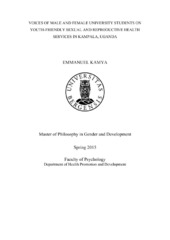| dc.description.abstract | This study explored the experiences and expectations of male and female students at Makerere University's main campus and the campus of the University's Business School towards youth-friendly sexual and reproductive health services. It also explores the attitudes and perceptions of health workers and parents towards young peoples' sexuality and compromising health challenges including the risk of contracting STIs/HIV and unwanted pregnancies that can lead to unsafe abortions. The study was guided by one human rights framework for professionalism in health care, which postulates that all health care services must be Available, Accessible, Acceptable and of good Quality for all. Furthermore, a theoretical perspective on gender as well as the three bodies approach guided the analysis and discussions of the empirical data. Since the study was explorative, primary data were generated using focus group interviews, in-depth interviews and observations. Research findings indicate that greater access and availability of treatment and drugs for STIs/HIV infections like Antiretroviral (ARV's), Post-Exposure Prophylaxis (PEP) and Emergency Contraceptive Pills (ECP's) have created laxity and false confidence amongst male and female university students. Perceiving HIV like any other disease has made young people engage in unprotected sex with multiple sexual partners. For instance, female university students in this study feared pregnancy more than STIs/HIV in fear of social stigma and early child-care responsibilities, misinformation and access to pornographic material from social media like WhatsApp, Internet, sexualized images displayed in some tabloids and frequent uncensored videos on televisions, have impacted greatly on young peoples´ attitudes and perceptions of their own sexuality. The gender and power imbalances concerning females' capacity to negotiate safer sexual relations is significant, as male dominance in decision-making and control in sexual relations prevails. Finally, failure to recognize young people as clients for sexual and reproductive health (SRH) services by some health care providers and parents shows a gap between young peoples' needs and service utilization, and therefore, their voices need to be represented. | en_US |
